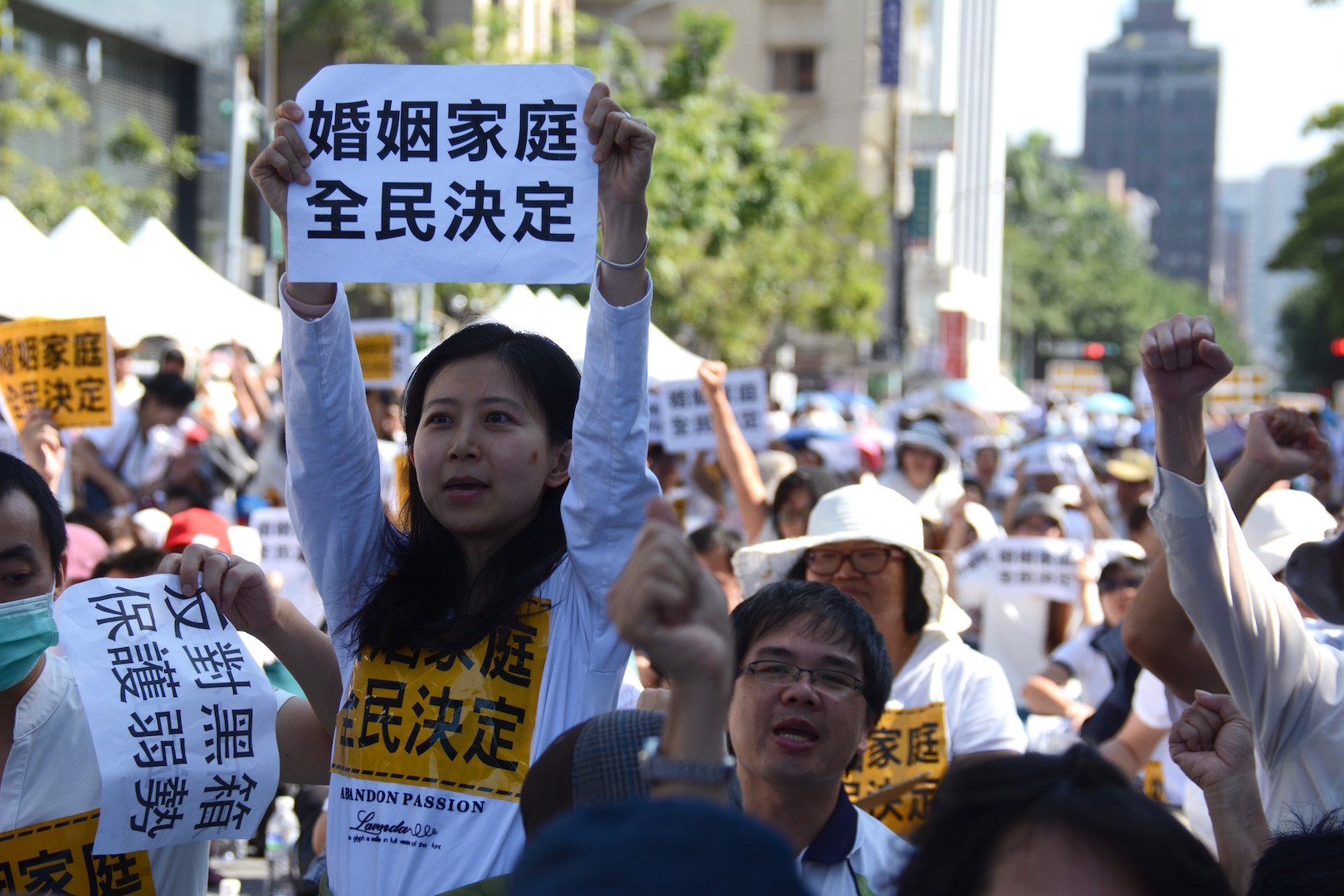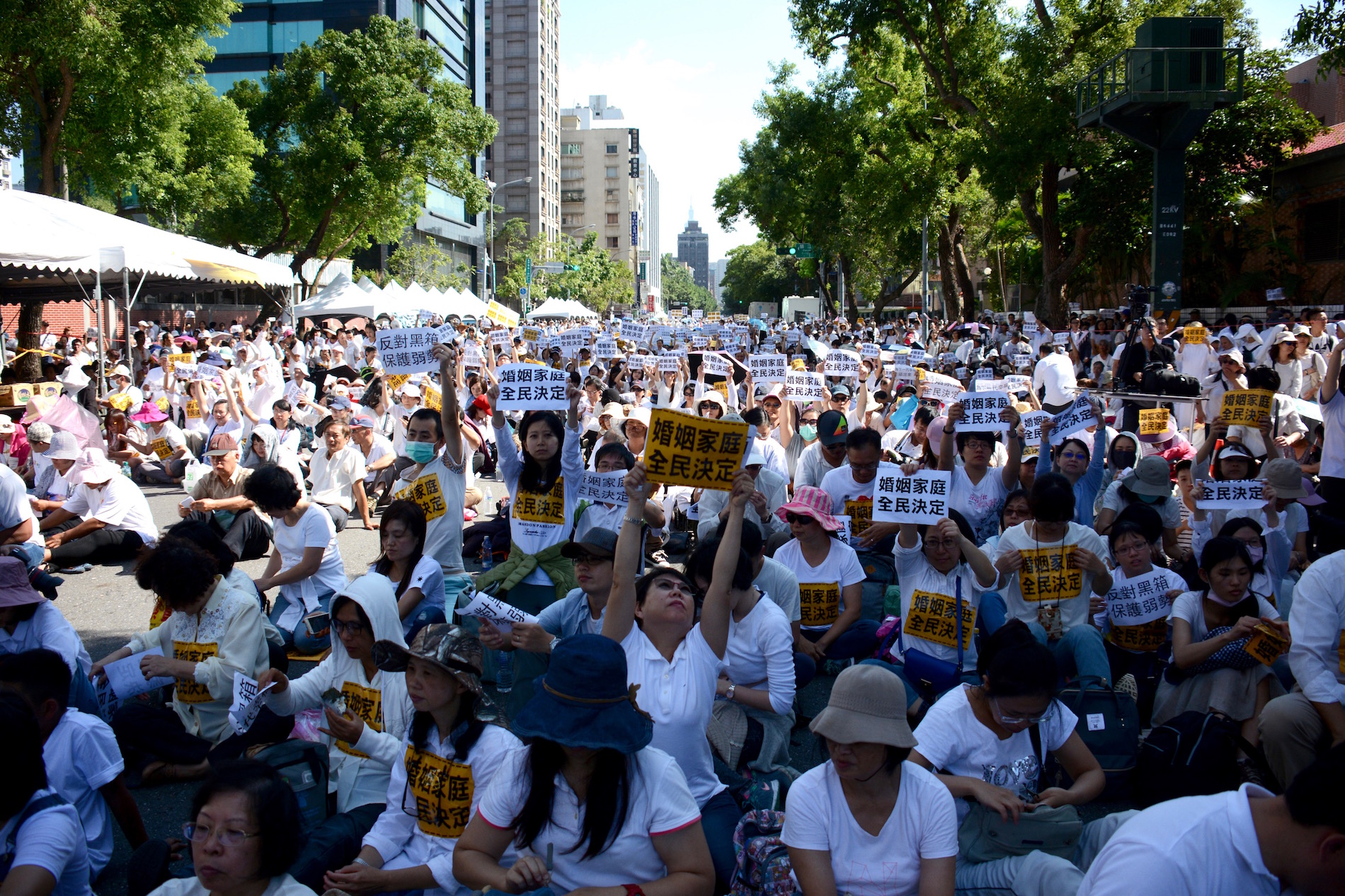By J. Michael Cole
Several thousand people on Thursday gathered outside the legislature in Taipei as legislators met inside the chambers to debate the legalisation of same-sex marriage in Taiwan. Amid changing attitudes, the country is poised to become the first in Asia to do so.
Brought by the busload from all over the nation, the white-clad protesters — the majority of them from Christian churches — assembled on a main road outside the barricaded parliament, chanting slogans and seeking to pressure legislators to delay, or cancel altogether, the passage of amendments to the civil code that would permit homosexual unions.

After years of efforts by activists and legislators, hopes for legalisation were boosted with the election in January this year of Tsai Ing-wen of the Democratic Progressive Party (DPP), who campaigned on marriage equality. Her party has traditionally been more favorable – albeit not universally – to LGBT rights than the more conservative Kuomintang (KMT), which for the first time in Taiwan’s history lost its majority in the January elections.
Outside the main gate of the legislature and away from the protest site, a small group of LGBT activists were holding a press conference. Facing them, a middle aged woman, arm outstretched in prayer, stood bawling and ululating — to “heal” the people across the divide or “save” her country from alleged destruction, no one could tell. Such displays of religiousness have been a regular feature at rallies against legalisation in recent years.
This largely Christian flavor to the protest is unsurprising, despite the fact that Christians account for little more than 7 percent of the overall population of 23 million in Taiwan. In recent years, conservative evangelical churches, such as the Bread of Life Christian Church, have taken the lead on the issue and created their own organizations to prevent passage of related legislation. Besides using similar rhetoric as in other countries that have gone through the process of legalization, the Protect the Family Alliance and the Happiness of the Next Generation Alliance, two of the main groups opposing same-sex marriage, have adopted an ideology that finds its roots in ultra-conservative churches in the United States, such as the International House of Prayer (IHOP).

As I walked around the legislative compound I came upon several people wearing T-shirts with the words “Jesus” or “God” on them; I also encountered several dozen nuns, priests and preachers. Tellingly, despite Taiwan being a largely Buddhist society, I did not come upon a single Buddhist religious figure — evidence, yet again, that a small minority from an exogenous religion has been able over the years to co-opt government officials and prevent legislation that is favored by a majority of people, particularly among Taiwan’s youth, where support stands at more than 90 percent.
In addition to their political connections — historically if one wanted to climb the ranks of the KMT being Christian was definitely an asset — opponents of same-sex marriage have also benefited from large financial resources. Among others, HTC chairwoman Cher Wang, one of the wealthiest individuals in Taiwan, is closely affiliated with the Bread of Life Christian Church and over the years has used her Christian Faith, Hope and Love Foundation to bring to Taiwan preachers from churches like IHOP (David Sliker, a Senior Leader at IHOP Kansas City, is one of them). One day before today’s protest, the alliances bought half-page front-page ads in the nation’s main newspapers.
Two draft amendments, one by the DPP and another by the KMT, passed first readings at the Legislative Yuan on November 8. The legislature’s Judiciary and Organic Laws and Statutes Committee is now discussing the proposals, with a second and third reading necessary before marriage equality can become law. At the moment, 67 legislators, or 59.3% of the Legislative Yuan’s 113 seats, support legalisation. Recently, 200 judges also signed a petition stating that marriage equality would benefit the nation.

Claiming, against all evidence, that they speak on behalf of the “silent majority,” opponents argue that the decision of whether to allow same-sex unions should be put to a national referendum. Such calls have sparked derision among LGBT activists and their supporters, who counter that the decision of whom to marry is nobody’s affair but that of the two individuals involved. Anti-legalisation groups and some KMT legislators have also called for further public hearings, which pro-legalisation groups argue are unnecessary (several have already been held) and a stalling tactic.
The opponents’ argument against legalising same-sex marriage has revolved around a number of recognisable tropes, and includes the claim that such a move would result in, among other things: the spread of AIDS, bestiality, promiscuity, sexual liberation, pedophilia, rape, rampant abortions, the dilution of the “bloodline,” negative effects on an already low birthrate, the destruction of “traditional family values,” confused (or “brainwashed”) youth, the exoneration of criminals, substance abuse, social chaos and several other ills, all unsupported by evidence from societies that have already legalised homosexual unions. They also claim that LGBT rights is a Western concept alien to Asian values, unaware that the religious doctrines upon which most of their case (such as it is) has been built also originate from outside.
A few blocks away from the protest, a small group of LGBT activists gathered in the basement of a coffee shop popular with civil society, watching — and often loudly reacting to — a live telecast of the debate at the legislature. Some of them were working the phones, calling their contacts and trying to convince the KMT not to stall the matter any further. Although the outcome of today’s legislative session was expected to take Taiwan one step closer to legalisation and, for many, reaffirm Taiwan’s tolerant and distinct identity, they are not there yet.

“We appreciate that legislators acknowledge the fact that LGBT families need this protection by the law,” said Jennifer Lu, research fellow at the Taiwan Tongzhi Hotline Association, the nation’s oldest LGBT organization. “We also appreciate that some members of the legislature are working very hard to make things happen.”
“The protesters’ ideas come from their religion. They don’t discuss law or policy,” Lu said. “So another public hearing is not necessary.”
“Taiwan could be the first country in Asia to have marriage equality law. That’s based on our democratic system, which we’re working very hard to protect,” she said. “Sadly, some KMT legislators are using undemocratic means to try to block the process.”
Lu said she hoped the amendments can be passed in the current legislative session.
After a long day of negotiations, legislators agreed to hold two extra public hearings, one chaired by the DPP and the other by the KMT, next week. Upon hearing the news, a number of protesters outside got on their knees and thanked God.
J. Michael Cole is a Taipei-based senior non resident fellow with the China Policy Institute, University of Nottingham, and an associate researcher with the French Center for Research on Contemporary China.
